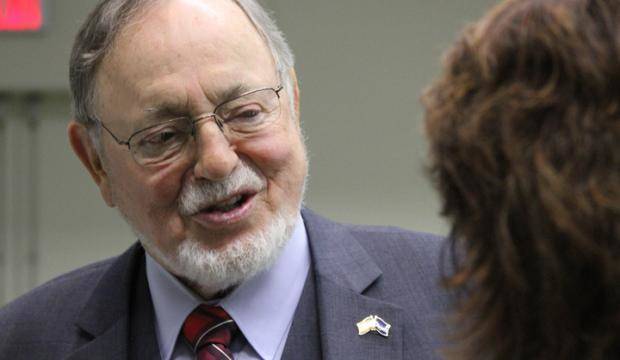Newly released reports from the Federal Election Commission show big financial support for incumbent U.S. Rep. Don Young, R-Alaska, ahead of the Aug. 21 statewide primary election.
Through Aug. 1, Young’s re-election campaign reported receiving $795,651 in contributions. Based on financial contributions alone, his leading challenger is independent Alyse Galvin, who reported raising $594,646 by Aug. 1.
Galvin will appear in the Aug. 21 Democratic primary alongside a handful of registered Democrats also competing for the party’s nomination. The leading Democrat in the race is Dimitri Shein, but Shein did not report fundraising totals by the Aug. 9 federal deadline. When reached by email, Shein said he would talk to his campaign treasurer about the issue. He added that he is self-funding his campaign “and a more accurate picture would take into consideration (my) ability to self-fund.”
Shein reported $190,829 in contributions before June 30, the latest date for which figures are available.
Among the seven candidates — three Republicans, three Democrats and one independent — the only other candidate to report fundraising is John Thomas Nelson, who has reported raising $4,939 as a Republican challenger to Young. Candidates are required to file FEC reports if they collect or spend more than $5,000 on their campaigns.
An analysis published by the election commission shows a significant divergence in the way the leading candidates are receiving their money. Galvin has received more than $192,000 in contributions from people giving $200 or less; Young has received a little over $37,000 from small contributors. Looking at large contributors, the situation is reversed: Young has received $164,500 from people donating $2,000 or more, while Galvin has received $112,200.
Young has also received a significant amount of money from political action committees. Forty-seven percent of his fundraising tally, or just under $376,000, has come from organized PACs. Galvin has accepted $9,000 in PAC contributions, or about 1.5 percent of her fundraising total. No other candidate lists any PAC donations.
Galvin received $4,000 from the NEA Fund for Children and Public Education, and another $4,000 from the defunct campaign of Steve Lindbeck, who unsuccessfully challenged Young in 2016. The remaining $1,000 came from the United Food and Commercial Workers Local 1496.
Young’s top corporate contributor is Edison Chouest Offshore, the corporation that recently won the contract to run the tugboats that escort oil tankers into and out of Valdez.
The San Diego Union-Tribune this week said Edison Chouest is also behind the legal defense fund of a Congressman under scrutiny for illegal campaign spending.
Young’s No. 2 corporate contributor is telecommunications firm GCI, followed by Trident Seafoods, Lynden Inc. and Carnival Cruise Lines.
Shein’s statement about self-funding his campaign is mostly accurate; he has pledged more than $142,000 of his own money to his campaign.
Alaska’s primary election is Aug. 21 and will see the field of seven candidates narrowed to two ahead of the Nov. 6 general election. Incumbent Young is the “Dean of the House,” the longest-serving active Congressman, having been in office since 1973 and re-elected 21 times.
Young entered the race with a significant financial advantage. Though he has spent more than $630,000 on his campaign so far, he still has almost $435,000 in cash on hand because of prior fundraising efforts.
Galvin has spent $342,830 and has almost $252,000 on hand. Shein had spent just over $71,000 by June 30.
• Contact reporter James Brooks at jbrooks@juneauempire.com or 523-2258.

